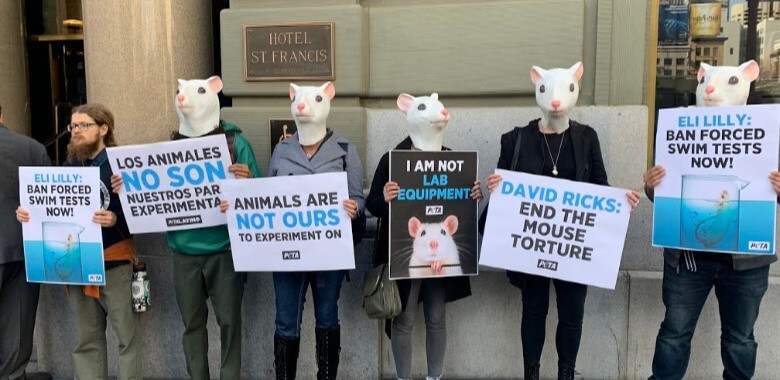PETA Demands Eli Lilly Explain Forced Swim Test at Annual Meeting
Pharmaceutical giant Eli Lilly is about to face some tough questions at its upcoming annual meeting. How do we know? Because the company has been caught conducting a cruel and useless test on animals, and PETA is a shareholder.
What Is Eli Lilly Doing to Mice and Other Small Animals?
Between 1993 and 2019, Eli Lilly employees published at least 20 papers and submitted at least 11 patent applications describing the use of the notorious forced swim test.
In the widely discredited test, mice and other small animals are placed in inescapable beakers filled with water. They’re made to swim in order to keep from drowning, purportedly to shed light on the effectiveness of antidepressant medications.

Watch this quick video to learn more:
At least 3,400 small animals were subjected to this torment by Eli Lilly employees. Yet the test did not reliably predict the success of a single medication in humans.
What Is PETA Asking Eli Lilly to Do?
Amid the COVID-19 pandemic, Eli Lilly’s annual meeting is going virtual this year. But that’s not stopping PETA, which owns just enough stock in the company to allow us to submit a proposal. As permitted by regulations, we’ve asked Eli Lilly to assess the effectiveness of the forced swim test, then report its findings to shareholders.
That’s because we know the company will have to admit that the forced swim test doesn’t accurately predict whether a drug will work as a human antidepressant. It yields positive results for compounds that aren’t prescribed as human antidepressants—such as caffeine—and negative results for compounds that are. Even Eli Lilly’s bestseller, Prozac, hasn’t yielded consistent results when studied in forced swim tests.

If Eli Lilly refuses to join other industry leaders that have made the commitment never to use the forced swim test again, then it should have to explain to its shareholders why it thinks terrifying and nearly drowning a mouse is a good idea.
While the fear of drowning is very real for the animals involved in the forced swim test, the experience in no way represents the enduring and multidimensional nature of depression. When nine of Eli Lilly’s biggest competitors have banned this atrocity at PETA’s request, it’s baffling that it refuses to acknowledge that it’s defending archaic practices.
—PETA neuroscientist Dr. Emily Trunnell
Help Stop Animals From Suffering in the Forced Swim Test—Join the Effort to End It
The forced swim test is bad science. Such archaic experiments do little more than terrify animals and delay the development of new, human-relevant treatments. And other pharma giants agree.
After discussions with PETA, pharmaceutical companies including Bayer, AstraZeneca, Novo Nordisk A/S, Johnson & Johnson, AbbVie, Roche, Boehringer Ingelheim, Pfizer, Bristol-Myers Squibb, and Sage Therapeutics all announced that they would no longer conduct or fund this cruel test.
More than 325,000 members of the public have contacted Eli Lilly to request a ban on the use, funding, or commissioning of the test—will you join them? Rats and mice used in experiments need your support.

